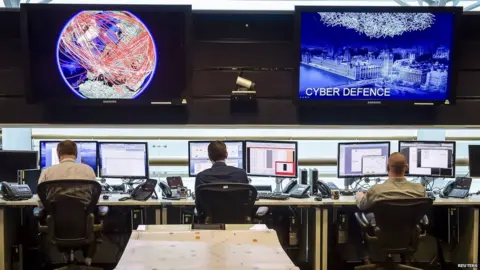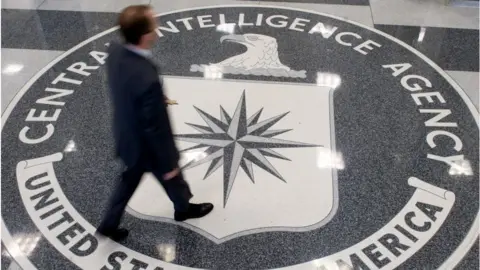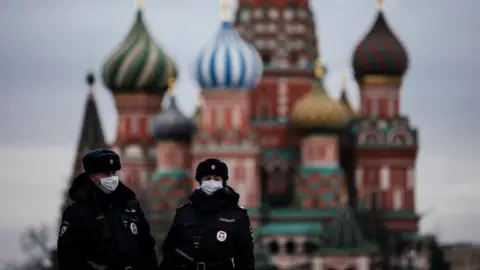Coronavirus: How will it change national security and spying?
 Reuters
ReutersA senior intelligence officer rushes in to a meeting with the latest report and places it in front of anxious politicians and policymakers.
In the past, it might have contained details about a planned terrorist attack - perhaps a cell in the Middle East looking at a new way of taking down an airline. This would lead to the well-practised national security machine cranking into gear.
But in the future, that report may instead be about an outbreak of a virus in a far-off country which was being concealed by its government.
Since the 9/11 attacks nearly 20 years ago, national security has been dominated by terrorism. But there have been voices over the years who have argued the notion of 'security' should be broadened and the coronavirus crisis has raised a significant question about whether global health security should be a more central part of national security.
Under the last review, an international pandemic was classed as a Tier 1 national security risk in the UK - meaning it was judged to be of the highest priority - but that has not been reflected in the resources or the way in which the issue has been tackled when compared with the other three threats at the same level - terrorism, war and cyber-attacks.
But just as in the wake of 9/11, there are people who feel they were not listened to when they warned the lights were blinking red about our health security.
For spy agencies, adapting may take a significant gear change. A priority for policy-makers will be knowing the ground-truth about the health situation in another country.
For agencies like MI6 and the CIA that recruit human sources, it may mean ensuring you have agents in the right place who can report back on what is really happening.
There may also be shifts in what agencies who intercept communications look for and in technical intelligence, satellites may be tasked to look at medical or even burial sites.
Just as technology was developed to remotely 'sniff' for traces of nuclear material, new devices may be required to scan for health and bio-threats.
But that is still largely the traditional world of intelligence gathering.
The real future may be in the use of more complex data sets and artificial intelligence to spot, understand and predict developments in a population.
 SAUL LOEB/AFP/Getty Images
SAUL LOEB/AFP/Getty ImagesAnalysing meta-data from phones, online searches or other forms of activity could be used. Four years ago, the then-director of digital innovation for the CIA told me about work the agency was doing to study population-level data of a whole country using AI and techniques like 'sentiment analysis'.
The idea was to be able to spot events - like an approaching breakdown in law and order and the potential for a revolution - before it was necessarily obvious.
Here the US and China are already engaged in a race for superiority, which many in Washington fear they may be losing as China has invested hugely in building capabilities and acquiring data.
One of the major unknowns is how this crisis will play into rising nationalism in recent years. It could be the spread of the virus underlines the global, interconnected nature of our world and this leads to greater collaboration, including in information sharing about any new pandemics.
Or it could be that borders close and countries turn inwards - refocusing the need for intelligence gathering on what other countries might be doing and hiding or new breakthroughs they may have made.
'Biological espionage' has a long history - in the Cold War, the West and Soviet Union were desperate to understand what secret biological pathogens and nerve agents the other side might be developing. In the future, the emphasis may be less about weapons and more about vaccines.
The long-held fears that terrorists or other groups could unleash bio-weapons will also be turbo-charged by recent events with already some signs that far-right groups have thought about deliberately trying to spread the virus. The US Department of Justice has said those intentionally doing so could be charged as terrorists.
The shift in the last few years to understand and counter disinformation by hostile states already looks to have a continuing importance in this world, but there are also challenges domestically.
One of the questions that may emerge from the current crisis is how far countries with a greater domestic surveillance capacity use it to spot the spread of any virus and also understand and control the movement of people to prevent further spread.
 Getty Images
Getty ImagesChina has been using smart-phone tracking software to do this. Russia has been using CCTV and its facial recognition system to look for people breaking restrictions. Other countries have created 'electronic fences' to notify the state when people move out of quarantine areas.
The UK and US have also been talking to tech companies about what they can do. But civil liberties advocates are worried surveillance tools could be introduced to help control a virus but then remain in place or be repurposed by a country for political control.

- A SIMPLE GUIDE: How do I protect myself?
- MAPS AND CHARTS: Visual guide to the outbreak
- LOOK-UP TOOL: Check cases in your area
- HOW FAST IS THE VIRUS GROWING? The UK spread compared to other countries
- WHAT WE DON'T KNOW How to understand the death toll

There will also be a need for a different set of skills for those who analyse intelligence. Health experts will need to sit alongside military experts to process and write reports based on what comes in and present them to policymakers, but they may be wary of being 'securitised' by other parts of the state.
A key question for analysts at the moment is how far the virus is undermining the capability of governments and their militaries to act and who else might take advantage of that.
There have already been signs the intelligence world is moving to adapt. Israel's foreign intelligence agency, the Mossad, reportedly carried out an operation to bring 100,000 test kits from abroad although they may have been lacking crucial parts.
Meanwhile, the country's domestic security agency Shin Bet began to use phone data to track those who may have come into contact with the virus to warn them.
In the US meanwhile, the intelligence community provided a series of classified briefings to policy-makers in January and February about the dangers of coronavirus based on what it could glean from China. However, it has also been reported these made little impact with the White House.
That is a reminder of something spy agencies have always known - however good the intelligence is, it doesn't matter if people at the top don't listen.
